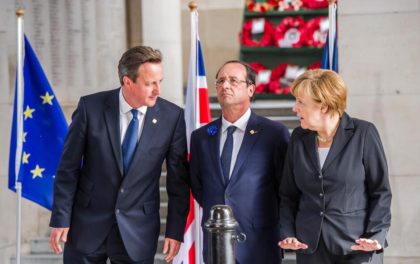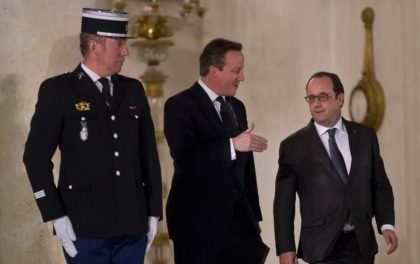
THIEPVAL, France (AP) — Side by side, row by row, French and British graves pay tribute to two nations standing united a century ago in one of the defining battles of World War I. Their flags still flutter together over the Thiepval Memorial, but as Britain prepares to vote on whether to leave or stay in the European Union, goodwill between the continent and the island nation is fraying. Britain’s age-old anti-Europe streak has never run so deep. And the continent, especially France, is making it clear that political commitment is not a one-way street.
From left, British Prime Minister David Cameron, French President Francois Hollande and German Chancellor Angela Merkel participate in a ceremony to mark the Centenary of World War I at the Menin Gate in Ypres, Belgium. As Britain prepares to vote whether to leave or stay in the European Union on June 23, 2016, goodwill between the continent and the island nation is fraying on both sides. «If we leave, it is like a separation again — and being torn apart. It breaks all of these bonds,» said Emma Jacques, a 15-year-old student of Sheffield’s King Ecgbert School as she stood contemplating the memorial to Franco-British friendship. It commemorates tens of thousands who fell in the six-month Battle of the Somme which started July 1, 1916.
Campaign put on hold
Polls indicate Thursday’s vote is too close to call, especially in the wake of the slaying of the U.K. lawmaker Jo Cox. While the «leave» camp seemed to be gaining strength in recent days, the tragic killing appears to have snuffed out that momentum as campaigning is put on hold. At the Arc de Triomphe in Paris, close to France’s tomb of the Unknown Soldier, France’s Laurence Coin felt ambivalent. «They are completely legitimate as an EU member,» she said, noting that some of their soldiers were killed on French ground. «But they need to say it loud and clear, or leave.» Coin, 54, no longer sees the lofty ideals of cooperation dominating the EU as London has in recent years increasingly sought to pay less into EU coffers, reclaim more decision-making powers, and criticized decisions made in Brussels. «It looks like they only want to have the good part of the union, but don’t want to share the cost,» she said.
Have the strongest views
Among EU countries, France seems to have the strongest views on the unity of Europe and Britain’s role in it. A Pew Research Center survey on the possibility of a British exit from the bloc, or Brexit, found that in France, which has long been among the staunchest advocates of integration, 32 percent of people think it would be good for Britain to leave. That’s the highest among ten EU nations surveyed. That comes despite the fact that many continental nations appreciate Britain for its military clout, diplomatic prowess and powerful and open economy. EU countries like the Netherlands and Sweden have also embraced Britain’s free-market approach. So, as much as most in Europe still think it would be bad for the EU to see Britain go, many also want the country to be a more active and enthusiastic member of the EU — not just standing on the sidelines, criticizing the bloc’s methods and actions.
Sign of EU failure
The EU has been mired in crisis for almost a decade, as it struggled to cope with, among other things, financial turmoil and the arrival en-masse of refugees and migrants. A British exit would be seen as a sign of failure for the bloc and could encourage other states to reconsider their membership.All that would play into the hands of anti-EU political movements and parties. Among the most powerful and vocal is France’s far-right National Front, led by Marine Le Pen. She supports a Brexit «with all my strength and all my heart.» She believes it could be a model for other countries seeking to leave the EU and a tipping point in history. It «will prove that it is possible to live outside the European Union,» she said recently.Moisi argues that such anti-Europeans think «it’s the beginning of a populist wave that is going to continue with (Donald) Trump and end with Marine Le Pen» sitting in the Elysee Palace after next year’s French presidential elections. Sylvie Corbet in Paris contributed to this report for Associated Press.




